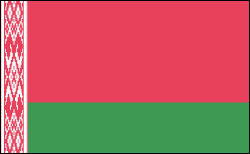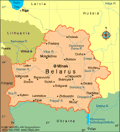Belarus
President: Alyaksandr Lukashenka (since 1994)
Prime Minister: Mikhail Myasnikovich (since 2010)
Total area: 80,154 sq mi (207,600 sq km)
Population (2010 est.): 9,612,632 (growth rate: &ndaqsh;0.3%); birth rate: 9.7/1000; infant mortality rate: 6.3/1000; life expectancy: 70.9; density per sq km: 46
Capital and largest city (2003 est.):Mensk (Minsk), 1,769,500
Other large cities: Gomel, 502,200; Mogilyov, 374,000; Vitebsk, 355,800; Grodno, 314,100; Brest, 306,300; Bobruysk, 228,100
Monetary unit: Belorussian ruble
National Name: Respublika Byelarus'
Current government officials
Languages: Belorussian (White Russian), Russian, other
Ethnicity/race: Belorussian 81.2%, Russian 11.4%, Polish 3.9%, Ukrainian 2.4%, other 1.1% (1999)
Religion: Eastern Orthodox 80%, other (including Roman Catholic, Protestant, Jewish, and Muslim) 20% (1997 est.)
National Holiday: Independence Day, July 3
Literacy rate: 100% (2003 est.)
Economic summary: GDP/PPP (2009 est.): $116 billion; per capita $11,600.Real growth rate: –0.2%. Inflation:10%. Unemployment: 1% (2009 est.) officially registered unemployed; large number of underemployed workers.Arable land: 26.77%. Agriculture:grain, potatoes, vegetables, sugar beets, flax; beef, milk. Labor force:4.3 million (Dec. 31, 2005); agriculture 14%, industry 34.7%, services 51.3% (2003 est.). Industries: metal-cutting machine tools, tractors, trucks, earthmovers, motorcycles, televisions, chemical fibers, fertilizer, textiles, radios, refrigerators. Natural resources: forests, peat deposits, small quantities of oil and natural gas, granite, dolomitic limestone, marl, chalk, sand, gravel, clay. Exports:$24.8 billion f.o.b. (2009 est.): machinery and equipment, mineral products, chemicals, metals, textiles, foodstuffs. Imports: $30.4 billion f.o.b. (2009 est.): mineral products, machinery and equipment, chemicals, foodstuffs, metals. Major trading partners: Russia, UK, Netherlands, Poland, Germany, Ukraine (2004).
Communications: Telephones: main lines in use: 3,368,000 (2006); mobile cellular: 2,239,300 (2004). Radio broadcast stations: AM 28, FM 37, shortwave 11 (1998). Television broadcast stations: 47 (plus 27 repeaters) (1995). Internet hosts:20,973 (2005). Internet users: 1.6 million (2005).
Transportation: Railways: total: 5,512 km (2004). Highways: total: 79,990 km; paved: 69,351 km; unpaved: 10,639 km (2004).Waterways: 2,500 km (use limited by location on perimeter of country and by shallowness) (2003). Ports and harbors: Mazyr. Airports: 101 (2005).
International disputes: 1997 boundary treaty with Ukraine remains unratified over unresolved financial claims, preventing demarcation and diminishing border security; the whole boundary with Latvia and more than half the boundary with Lithuania remains undemarcated; discussions toward economic and political union with Russia proceed slowly
Major sources and definitions |
 |
Geography
Much of Belarus (formerly the Belorussian Soviet Socialist Republic of the USSR, and then Byelorussia) is a hilly lowland with forests, swamps, and numerous rivers and lakes. There are wide rivers emptying into the Baltic and Black seas. Its forests cover over one-third of the land and its peat marshes are a valuable natural resource. The largest lake is Narach, 31 sq mi (79.6 sq km).
Government
Republic.
History
In the 5th century A.D., Belarus (also known as White Russia) was colonized by east Slavic tribes. Kiev dominated it from the 9th to 12th century. After the destruction of Kiev by the Mongols in the 13th century, the territory was conquered by the dukes of Lithuania, although it retained a degree of autonomy. Belarus became part of the Grand Duchy of Lithuania, which merged with Poland in 1569. Following the partitions of Poland in 1772, 1793, and 1795, in which Poland was divided among Russia, Prussia, and Austria, Belarus became part of the Russian empire.
Following World War I, Belarus proclaimed itself a republic, only to find itself occupied by the Red Army soon after its March 1918 announcement. The Polish-Soviet War of 1918–1921 was fought to decide the fate of Belarus. West Belarus was ceded to Poland; the larger eastern part formed the Belorussian SSR, and was then joined to the USSR in 1922. In 1939, the Soviet Union took back West Belarus from Poland under the secret protocol of the Nazi-Soviet Nonaggression Pact and incorporated it into the Belorussian Soviet Socialist Republic. Occupied by the Nazis in World War II, Belarus was one of the war's most devastated battlefields.
When the Chernobyl nuclear power plant in Ukraine exploded in 1986, 70% of its radioactive fallout fell on the Belorussian SSR. Cancer and other illnesses have multiplied as a result.
Expanded Presidential Power Leads to Oppression and Corruption
Belarus declared its sovereignty in July 1990 and its independence in Aug. 1991. It became a cofounder of the Commonwealth of Independent States (CIS) in Dec. 1991. In Jan. 1994, the country's parliament ousted its reform-minded leader, Stanislav Shushkevich, in protest against his support for market economics. He was replaced by Alyaksandr Lukashenka, who, over the next two years, greatly expanded the powers of the presidency. Lukashenka sought to renew ties with Russia, and, with much fanfare, Belarus and Russia signed a treaty in April 1997 aimed at significantly increasing cooperation between the two states, stopping just short of union. The Russian financial crisis that began in fall 1998 severely affected Belarus's Soviet-style planned economy.
The EU and the U.S. have denounced the increasingly oppressive political atmosphere and human rights violations in Belarus under the Soviet-style authoritarianism of President Lukashenka. In 1999, the year Lukashenka was to step down, he rigged a national referendum allowing him to cancel the elections and remain president. Lukashenka's government has been accused of running a death squad that has killed dozens, including opposition party members and underworld figures. After harassing the opposition and curtailing their campaign activities, Lukashenka won reelection in the Sept. 9, 2001, presidential race. In 2004, the Council of Europe strongly criticized the Belarus government for blocking investigation into the disappearance of four dissidents in 1999 and 2000.
Presidential elections in March 2006 reelected Lukashenka with 83% of the vote. Supporters of opposition candidates took to the streets of Minsk to protest the results. The police cracked down on the demonstrations and arrested dozens. The U.S. and other Western nations declared the election fraudulent, and the EU imposed economic sanctions on Lukashenka and a number of his ministers.
Relationship With Russia Is Tested
Despite the close ties of Russia and Belarus, the two countries clashed over imported Russian gas in early 2007. In Dec. 2006, Russia doubled the price of gas it exported to Belarus, and then imposed a large duty on oil exports. In response, Belarus imposed a tax on Russian gas in Jan. 2007. Russia then shut off an oil export pipeline to Europe (which spelled trouble for Europe, since half of all European exports of Russian gas are transported through Belarus). By mid-January, Russia agreed to cut its oil duty and Belarus agreed to cut its tax.
In September 2008, President Alyaksandr Lukashenka won all 110 seats in parliamentary elections, but European monitors criticized the flawed counting system in Belarus.
Lukashenka's Reelection Causes Protest and Controversy
On December 19, 2010, Alyaksandr Lukashenka, president since 1994, was reelected. According to government officials, he won by 79.7% of the vote. Andrey Sannikau was his closest challenger with 2.6% and voter turnout was 90.7%. On the day of the election, two presidential candidates were beaten by police while attending different opposition rallies. One of the candidates, Uladzimir Niaklajeu, was taken to a hospital where he was treated for a head injury. While in intensive care, he was abducted by Belarusian authorities. On the night of the election, ten thousand opposition protesters attempted to storm the government building of Belarus, smashing windows before police pushed them back.
On December 27, 2010, Prime Minister Syarhey Sidorski and his cabinet resigned. The next day, Lukashenka named Mikhail Myasnikovich as prime minister. The European Union along with the United States imposed sanctions on Belarus officials after the election and promised aid to opposition groups seeking to oust Lukashenka. Lukashenka has been referred to as Europe's last dictator.
In April 2011, a bomb exploded in a subway station next to Lukashenka's office. The explosion killed 12 people, wounded 150 others and strained an already tense political situation. No one claimed responsibility for the bomb. Lukashenka reported two days later that two suspects had confessed to the crime, but no other details were given.
Russia Bails Out Lukashenka While Protests Continue
In June 2011, Russia agreed to loan Belarus three billion dollars, which will be disbursed over three years. In exchange for the loan, Russian officials demanded that Belarus sell its factories to Russian companies, thus privatizing much of its state-owned industries. In providing the loan, Russia also bailed out President Alyaksandr Lukashenka whose already shaky popularity took a severe hit when the Belarusian ruble was devalued in the spring of 2011, which caused long lines for common goods like oil and sugar.
In the summer of 2011, at least 1,830 people were detained by police for antigovernment protests involving cell phones and hand claps. The arrests started when a small group of activists started clapping protests. At least 500 people have been sentenced to 5--–15 days. The financial crisis continues in Belarus where people have started hoarding food and converting their assets into currency, but this round of protests involved mainly young people who want more freedom.
In November 2011, Russia agreed on a gas deal that gave Belarus more than $14 billion in loans and discounts on natural gas. In return, Belarus gave full control of Yamal-Europe, its natural gas pipeline, which runs to Europe, to Gazprom, a Russian energy company. Before the deal, Gazprom owned 50 percent of the pipeline. Russian Prime Minister Vladimir Putin said that the deal and Gazprom's control of the pipeline from Siberia to the border of Poland will "ease relations with Belarus for years to come."
Political Prisoner Receives Early Release
On April 14 2012, Andrei Sannikov, a former presidential candidate, was released early from prison. Sannikov told a local website, Charter 97, that he had been pardoned by President Lukashenka. Sannikov, who once served as deputy foreign minister, was arrested in December 2010 after taking part in a protest. He was convicted of organizing unrest and sentenced to five years in prison. About his early release, Sannikov said to Charter 97, "Until the last minute I did not believe they would free me. They transferred me so many times from one prison to another that I thought it was just the next stage."
Sannikov's early release came after the European Union's recent increase in sanctions against Lukashenka's government. In March 2012, members of the European Union removed their ambassadors from Belarus and imposed a ban on travel for the country's top officials. In retaliation, Lukashenka barred several political opponents, journalists and human rights workers from leaving Belarus.
See also Encyclopedia: Belarus.
U.S. State Dept. Country Notes: Belarus
Ministry of Statistics and Analysis president.gov.by/Minstat/en/main.html .
U.S. State Dept. Country Notes: Belarus
Ministry of Statistics and Analysis president.gov.by/Minstat/en/main.html .

No comments:
Post a Comment